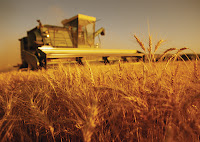 |
| Shamba Shape-up Presenters - Naomi Kamau & Tonny Njuguna Image courtesy of www.shambashepup.com |
"Shamba Shape-up" - focuses on a practical, hands-on production which features one or more farmers who gets a visit from the 2 presenters. These presenters are able to come with experts in various agricultural fields including veterinarian, crop production experts, soil scientists, carpenter( for animal structures) among others.
The presenters and experts use local Swahili language to explain the various challenges that the farmers and farming profession faces and how best to overcome them using local methods and solutions. They have also partnered with various local agricultural supplies firms such as Kenchic, Unga Group, Coopers(K), Syngenta, KARI along with agro-financing institutions such as FSD Kenya , AECF (Africa Enterprise Challenge Fund) and AGRA (Alliance for Green Revolution in Africa).
This is a great idea especially to us young farmers who are busy trying to make it in a field which has been shunned by many. It also helps to provide alternative solutions for us farmers with less of the textbook solutions that many others offer. Most of the ideas explored are usually very practical and one can always compare notes with what you are doing on your own farm.
Kudos to the producers, partners and all those who have made this innovative programme. We just hope it will continue coming on our screens and get more support. We would also love for other national and regional media houses to carry it to engage farmers from across the region in various ways of improving both crop production and animal husbandry.
Let's 'shape-up our Shambas'
For more info, you can check their link here, http://www.shambashapeup.com/ and also view some of the past episodes. Hope they can also work on improving the social and online media interaction to reach a wider audience of their targetted audience, in this our era!


